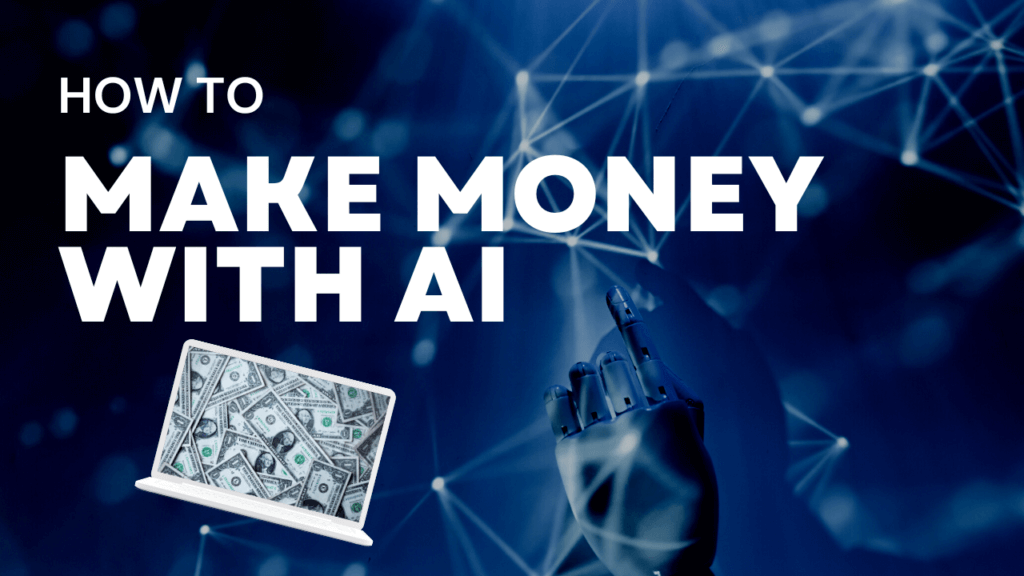Artificial Intelligence (AI) has revolutionized numerous industries, and the stock market is no exception. Whether you’re a seasoned investor or a novice looking to dive into the world of stocks, leveraging AI can significantly enhance your chances of making money. In this article, we’ll explore various ways AI can be utilized to maximize returns in the stock market, from predictive analytics to algorithmic trading.
The stock market is a complex, dynamic environment where making informed decisions can mean the difference between profit and loss. Enter Artificial Intelligence (AI), a game-changer that’s transforming how investors approach the market. By leveraging AI, you can gain deeper insights, automate trading, and manage your portfolio more effectively. Let’s dive into how AI can be harnessed to make money in the stock market.
Understanding AI and Its Role in Stock Market Investing
What is AI?
AI refers to the simulation of human intelligence in machines designed to perform tasks that typically require human intelligence. These tasks include learning from data, recognizing patterns, and making decisions. In the stock market, AI helps analyze massive datasets, predict trends, and execute trades with unprecedented speed and accuracy.
How AI is Transforming Financial Markets
AI is revolutionizing financial markets by enhancing data analysis, improving trading strategies, and optimizing portfolio management. It provides investors with tools that can process and interpret data far beyond human capability, leading to more informed investment decisions.
Types of AI Technologies Used in Stock Market
Machine Learning
Machine learning, a subset of AI, involves training algorithms to recognize patterns in data. In stock trading, machine learning models can analyze historical price data and forecast future trends, making them invaluable for predicting stock movements.
Natural Language Processing (NLP)
NLP allows AI to understand and interpret human language. In the stock market, NLP is used to analyze news articles, earnings reports, and social media to gauge market sentiment and predict how news will impact stock prices.
Neural Networks
Neural networks are AI systems modeled after the human brain. They are particularly useful in recognizing complex patterns in large datasets. In stock trading, neural networks can identify subtle trends and anomalies that other models might miss.
Robotic Process Automation (RPA)
RPA involves automating repetitive tasks. In finance, RPA can streamline processes such as data entry, trade execution, and compliance checks, freeing up time for more strategic decision-making.
Predictive Analytics: Forecasting Stock Trends
How AI Predicts Stock Prices
Predictive analytics uses AI algorithms to analyze historical data and forecast future stock prices. These models can incorporate various factors, including market conditions, economic indicators, and company performance.
Examples of Predictive Models
Some common predictive models include regression analysis, time-series forecasting, and ensemble methods. Each model has its strengths and is chosen based on the specific requirements of the analysis.
Benefits and Limitations
While predictive analytics can provide valuable insights, it’s not foolproof. Models can be affected by unexpected events or changes in market conditions. Thus, it’s essential to use predictive analytics as part of a broader strategy.
Algorithmic Trading: Automated Stock Trades
What is Algorithmic Trading?
Algorithmic trading involves using AI algorithms to execute trades based on predefined criteria. These algorithms can analyze vast amounts of data, identify trading opportunities, and execute trades faster than human traders.
How AI Algorithms Execute Trades
AI algorithms analyze market data in real-time, making split-second decisions to buy or sell stocks. This automation helps capitalize on short-term market movements and reduce human error.
Advantages of Algorithmic Trading
Algorithmic trading offers several advantages, including increased speed, reduced transaction costs, and the ability to execute complex strategies that would be difficult for humans to implement manually.
Sentiment Analysis: Gauging Market Sentiment
Role of Sentiment Analysis in Stock Trading
Sentiment analysis involves evaluating the mood or attitude of market participants towards a particular stock or the market as a whole. This can provide insights into how news, events, or social media trends might impact stock prices.
Using NLP to Analyze News and Social Media
NLP techniques are employed to process and interpret text from news articles, social media posts, and other sources. By analyzing this data, AI can gauge overall sentiment and predict its impact on stock performance.
Impact on Investment Decisions
Understanding market sentiment helps investors make more informed decisions. For instance, positive sentiment might indicate a buying opportunity, while negative sentiment could signal a potential sell.
Portfolio Management: AI-Driven Asset Allocation
How AI Optimizes Portfolio Management
AI-driven portfolio management uses algorithms to analyze market conditions and optimize asset allocation. This ensures that your portfolio is balanced and aligned with your investment goals and risk tolerance.
Robo-Advisors and Their Benefits
Robo-advisors are AI-powered platforms that provide automated financial planning services. They offer benefits such as low fees, accessibility, and the ability to create personalized investment strategies based on your preferences.
Risk Management Strategies
AI can help manage investment risk by continuously monitoring market conditions and adjusting your portfolio accordingly. This dynamic approach helps protect your investments from unforeseen market fluctuations.
AI in High-Frequency Trading (HFT)
What is High-Frequency Trading?
High-Frequency Trading (HFT) involves executing a large number of trades at extremely high speeds. HFT strategies rely on AI to analyze market data and execute trades within milliseconds.
How AI Enhances HFT
AI enhances HFT by providing sophisticated algorithms that can process vast amounts of data and execute trades based on complex strategies. This allows traders to capitalize on micro-movements in the market that would be impossible to exploit manually.
Pros and Cons of HFT
While HFT offers significant advantages in terms of speed and efficiency, it also comes with drawbacks. These include potential market volatility and the risk of exacerbating market downturns due to rapid, large-scale trading.
Backtesting Strategies: Validating AI Models
Importance of Backtesting in Trading
Backtesting involves evaluating AI models against historical data to determine their effectiveness. This process helps ensure that the strategies are robust and can perform well in real market conditions.
How to Backtest AI Models Effectively
To backtest AI models, use historical data to simulate trading scenarios and assess performance. Ensure that the data is representative of different market conditions to get a comprehensive view of how the model might perform.
Common Pitfalls to Avoid
Common pitfalls in backtesting include overfitting, where the model performs well on historical data but fails in real markets, and neglecting to account for market changes over time.
Integrating AI with Human Expertise
Balancing AI and Human Insights
While AI offers powerful tools for stock market investing, it’s essential to combine these tools with human expertise. Human insights can provide context and understanding that AI might not fully capture.
Collaboration Between AI Tools and Financial Advisors
Financial advisors can leverage AI tools to enhance their decision-making processes. By integrating AI-driven insights with human judgment, advisors can offer more comprehensive and informed investment strategies.
Case Studies: Successful AI Applications in Stock Market
Notable Examples of AI-Driven Success
Several companies have successfully used AI to improve their trading strategies. Examples include hedge funds and trading firms that have implemented AI algorithms to achieve significant returns.
Lessons Learned from These Case Studies
Key lessons from successful AI applications include the importance of data quality, the need for continuous model refinement, and the benefits of combining AI with human expertise.
Challenges and Risks of Using AI in Stock Market
Potential Pitfalls of AI in Trading
Challenges with AI in trading include data quality issues, algorithmic errors, and the potential for unforeseen market events. Ensuring that AI systems are robust and adaptable is crucial for mitigating these risks.
Ethical and Regulatory Considerations
As AI becomes more prevalent in trading, ethical and regulatory considerations are increasingly important. Ensuring transparency, fairness, and compliance with regulations is essential to maintain market integrity.
Future Trends: What to Expect in AI and Stock Market
Emerging AI Technologies
The future of AI in stock market investing will likely see advancements in technologies such as deep learning, advanced natural language processing, and enhanced predictive analytics.
Predictions for the Future of AI in Finance
Expect AI to play an even more significant role in finance, with improved models for predicting market trends, automating trading, and managing portfolios. The integration of AI with other technologies like blockchain could also lead to new innovations.
Getting Started with AI in Stock Market Investing
Tools and Platforms for AI Trading
Numerous tools and platforms offer AI-driven trading solutions, including software for algorithmic trading, sentiment analysis, and portfolio management. Exploring these options can help you find the best fit for your needs.
Tips for Beginners
For beginners, start by familiarizing yourself with AI concepts and tools. Consider using robo-advisors or educational platforms to gain experience before diving into more advanced AI trading strategies.
Conclusion
AI is reshaping the landscape of stock market investing, offering powerful tools for predictive analytics, algorithmic trading, sentiment analysis, and portfolio management. By understanding and leveraging these technologies, you can enhance your investment strategies and potentially achieve better returns. However, it’s crucial to balance AI with human expertise and be aware of the risks and challenges associated with its use. Embrace the future of investing with AI and stay ahead of the curve
I am Komal Hatwaani, aims to provide readers with informative and engaging content that covers everything from technology and business to entertainment and lifestyle. This website dedicated to delivering high-quality content that informs, entertains, and inspires our readers.
Join us on our journey as we continue to explore the ever-evolving landscape of news and information, providing you with valuable insights and perspectives that enrich your digital experience.












